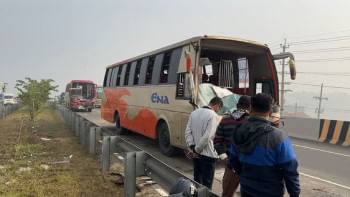Dhaka city corporations: Waterlogging forever?

Despite many initiatives and spending over Tk 730 crore over the past four years, Dhaka city corporations have failed to make any visible progress in mitigating the waterlogging problem.
Heavy rains last Friday left at least 22 areas in the capital submerged, causing distress to residents and commuters. Even after 36 hours, several areas remained under water.
The city corporations officially took over the responsibility for canal and drainage management from Wasa on December 31, 2020.
Four years and Tk 730 crore later, a lack of effective planning and proper management has left the waterlogging problem still unresolved.
"The drainage system is impaired due to poor design, weak maintenance, and various road construction activities," Mujibur Rahman, a former Buet professor, told The Daily Star.
"A lack of necessary maintenance has left the drainage network mostly blocked."
Two city corporation officials, speaking anonymously, said the funds were used for decluttering canals, canal-drains, and box culverts, as well as for removing accumulated waste.
However, they acknowledged that after a few days of cleaning, the canals quickly became clogged again.
On Friday, the Met office recorded 130mm of rainfall in just six hours from 6:00am, leading to extensive waterlogging across the city.
Areas such as Dhaka University's Zahurul Huq Hall and Curzon Hall areas; Swamibagh; Bakshi Bazar; Khaje Dewan; Mugda; Maniknagar; Gopibagh; Lalbagh; and the Buet campus were found submerged till yesterday.
Experts and environmentalists argue that the city corporations need to adopt more effective planning and management strategies to address this issue.
Mujibur blamed the filling up of waterbodies, canals, and lakes, as well as the poor drainage network for the persistent waterlogging.
He added that climate change will bring on more intense rains for shorter periods, which will further worsen the situation.
"The city corporations need to enhance their capacities, develop skills, increase manpower, and implement institutional reforms.
"A master plan is needed to restore canals and waterbodies, and create a primary drainage system."
Dhaka currently has a network of 2,211 kilometers of drains, with 961km in the south and 1,250km in the north. Before the city corporations assumed responsibility, efforts to stop waterlogging were primarily focused on open drains.
Now, the corporations are responsible also for canals and drains, requiring substantial financial investments.
In the last four years, the DNCC spent Tk 370 crore, and the DSCC spent Tk 360 crore. Despite these efforts, areas like Shantinagar, where around Tk 100 crore was spent, still experience severe waterlogging.
Experts said many canals, once crucial for drainage, have been encroached upon and narrowed over time. After independence, Dhaka had 57 canals, but this number has decreased to 26, most of which are in poor condition.
DNCC Mayor Atiqul Islam said some areas still face waterlogging due to waste accumulation in the drains, adding that strict action will be taken against those who dispose of waste into canals and drains.
DSCC Chief Executive Officer Mizanur Rahman said that habitual dumping of polythene and plastic wastes by city dwellers is another key reason for the poor drainage.
He added that ongoing development projects by various service agencies also contribute to the problem.
A 2019 study by Bangladesh Institute of Planners (BIP) revealed that Dhaka has lost 4.38 percent of its waterbodies over the last 20 years.
Adil Mohammad Khan, president of BIP, said a lack of qualitative change in urban planning and management is a major reason behind waterlogging.
He stressed the need for public involvement in initiatives to address the issue.
Syeda Rizwana Hasan, chief executive of Bangladesh Environmental Lawyers Association, criticised the authorities concerned for not taking appropriate legal action against the housing companies that encroached lowlands.
She called for comprehensive plans to resolve the problem and urged the city corporations to focus more on nature-based drainage systems.
Sharif Jamil, member-secretary of Dhoritro Rokkhay Amra, another environmental organisation, said, "Spending money without identifying the proper reasons [behind waterlogging] leads to the money being wasted. No project can solve waterlogging problems without considering the importance of nature.
"If the projects don't solve the problem, then the corporations should identify the reasons for their failure."



 For all latest news, follow The Daily Star's Google News channel.
For all latest news, follow The Daily Star's Google News channel. 








Comments